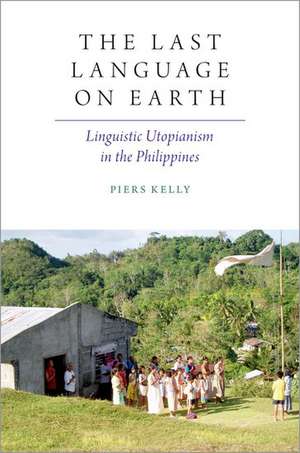The Last Language on Earth: Linguistic Utopianism in the Philippines: Oxford Studies in the Anthropology of Language
Autor Piers Kellyen Limba Engleză Paperback – 25 mai 2022
Preț: 230.80 lei
Preț vechi: 245.19 lei
-6% Nou
Puncte Express: 346
Preț estimativ în valută:
44.18€ • 48.00$ • 37.13£
44.18€ • 48.00$ • 37.13£
Carte disponibilă
Livrare economică 20-26 martie
Preluare comenzi: 021 569.72.76
Specificații
ISBN-13: 9780197509920
ISBN-10: 0197509924
Pagini: 328
Ilustrații: 47
Dimensiuni: 236 x 157 x 23 mm
Greutate: 0.48 kg
Editura: Oxford University Press
Colecția OUP USA
Seria Oxford Studies in the Anthropology of Language
Locul publicării:New York, United States
ISBN-10: 0197509924
Pagini: 328
Ilustrații: 47
Dimensiuni: 236 x 157 x 23 mm
Greutate: 0.48 kg
Editura: Oxford University Press
Colecția OUP USA
Seria Oxford Studies in the Anthropology of Language
Locul publicării:New York, United States
Recenzii
This fascinating work of linguistic anthropology is based on both the author's fieldwork in the Philippines and his meticulous and wide-ranging research...this engaging monograph is likely to be of interest to students and scholars in the fields of anthropology, sociology, history, political science, linguistics, and Southeast Asian studies.
What gives heart and humanity to Kelly's work with the Eskaya is how he is able to put the voices of the people at the center of his research.
This fascinating work of linguistic anthropology is based on both the author's fieldwork in the Philippines and his meticulous and wide-ranging research. Kelly (Univ. of New England, Australia) treats the endangered Eskayan language more like a multifaceted, animate character in a historical narrative than a quiescent subject of stuffy academic scrutiny. He also takes care to center Eskaya voices in his telling of the story of this unique language, still used by an estimated 550 people on the island of Bohol in the Visayan region of the Philippines.
By the end of reading this book, you will not only have a good understanding of the Eskayan language's origin, lexicon, writing system, and literature, but you will also receive a sense of the ideals and hopes of the Eskaya.
This book is excellent for linguists interested in learning more about artificial languages and the context in which one such language can establish itself securely within a community. It is also intended for those interested in learning about the different peoples and cultures in the world that do not receive as much media attention as larger communities and nations.
What gives heart and humanity to Kelly's work with the Eskaya is how he is able to put the voices of the people at the center of his research.
This fascinating work of linguistic anthropology is based on both the author's fieldwork in the Philippines and his meticulous and wide-ranging research. Kelly (Univ. of New England, Australia) treats the endangered Eskayan language more like a multifaceted, animate character in a historical narrative than a quiescent subject of stuffy academic scrutiny. He also takes care to center Eskaya voices in his telling of the story of this unique language, still used by an estimated 550 people on the island of Bohol in the Visayan region of the Philippines.
By the end of reading this book, you will not only have a good understanding of the Eskayan language's origin, lexicon, writing system, and literature, but you will also receive a sense of the ideals and hopes of the Eskaya.
This book is excellent for linguists interested in learning more about artificial languages and the context in which one such language can establish itself securely within a community. It is also intended for those interested in learning about the different peoples and cultures in the world that do not receive as much media attention as larger communities and nations.
Notă biografică
Piers Kelly is a linguistic anthropologist whose research centers on the varied uses of writing and graphic codes in non-state societies, especially in West Africa, Southeast Asia, and Australia. He has previously worked as a linguist with the National Commission on Indigenous People, Philippines, and is currently affiliated with the Centre for Australian Studies at the University of Cologne, the Max Planck Institute for the Science of Human History in Leipzig, and the University of New England in Armidale, Australia. He is a co-editor of Skin, Kin and Clan: The Dynamics of Social Categories in Indigenous Australia (ANU Press, 2018).





